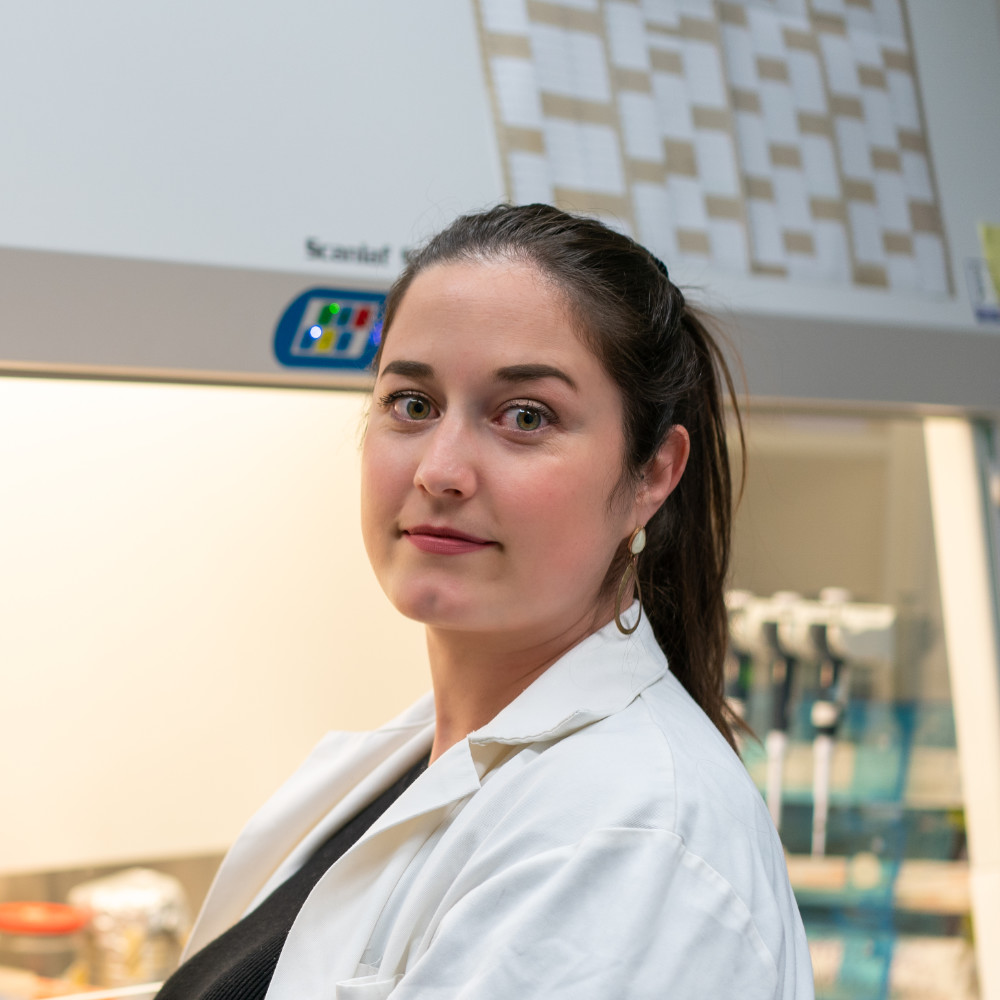Could you briefly introduce yourself?
I am from Ticino, the Italian part of Switzerland. I started my PhD in September 2019 and am now in my second year, in the Scapozza lab in the Pharmaceutical Sciences division. I did my Bachelor’s degree in biology at the University of Lausanne, and my Master’s in medical biology at EPF Lausanne. For my Master’s thesis I worked on gene therapy for hearing loss and on neurodegenerative diseases. At the end of my Master’s degree, I was not sure whether to do a PhD. But I really loved the work, so I stayed on for another two years. These two extra years really convinced me that I wanted to do a PhD.
I am a biologist, and my project is more focused on biology, exploring the role of a protein in a rare paediatric disease (Alport syndrome). My aim is to better characterize this protein and understand its involvement in the depolymerisation of hyaluronic acid. I am also testing compounds on cells and crystallizing a protein domain, but the chemical synthesis and the computational biology are done somewhere else.
What were your scientific/academic reasons for applying to Geneva?
I had always wanted to be a scientist. After my Master’s degree, I felt I wasn’t really a scientist with my own project. That is why I continued to PhD, it was for personal interest - I love being the lab, I love doing science, and owning my project. When I interviewed with my current lab, I really liked the project and the people here.
In Switzerland we are privileged - I do not think I have ever heard of anyone who had to quit the PhD for lack of funds. I had wanted to go to the US, but I was advised against it because the salaries are lower, the work conditions worse.
What were your personal motivations for applying to Geneva? What do you like about (life in) Geneva/Switzerland?
I wanted to stay in Switzerland and looked for positions in Zurich and Geneva because I wanted to stay in a bigger city than Lausanne. Geneva is an amazing city; it is really international! I moved here, and I really try to balance work and fun and enjoy the city.
What do you particularly like about your current lab?
My lab is amazing. We are a big group with a variety of projects, from chemical synthesis to mouse models. The best thing is the working environment: the atmosphere between colleagues is great and we have a very supportive PI. We also have a lot of collaborations for the project: in Germany, in various places in Switzerland, in Italy, in the US… Last year I have been to a collaborating lab in KIT [Karlsruher Institut für Technologie] to learn a particular technique; now I am collaborating with the Boland lab [at the Department of Molecular Biology] to do crystallization and working together with one of his PhD students. I am always interacting with collaborators, sending and receiving FedEx packages…the bill will be gigantic! =)
Do you have any opportunities to teach?
We have to do a lot of teaching in our program, but I love teaching! Usually, professors ask us to teach those courses that are closest to our expertise - I am teaching pharmacochemistry. In our lab each PhD student is doing 14 days per year of “travaux pratiques”.
What is the biggest change or challenge when moving from a Master project to a PhD thesis project?
I would say, responsibilities: during your Master project, you are doing a small part of a project that usually is planned so that it works. Everything is prepared, you know where you are going. During your PhD, you have an overall goal, but then it is all up to you, you start from zero and you have to find out how to get to the end.
How do you deal with the frustration inherent to research?
My colleagues are my lifeline – I am really lucky; we all got each other’s backs. When something does not work, we can all talk to each other, there is always someone around.
Other than that – yes, of course your project is important, but you have to think that in the grand scheme of things, nobody cares! (laughs) Just go for a walk, it will help you see the bigger picture.
Is there any advice you would like to share with prospective PhD students?
Yes, from my experience, applying for positions is a jungle – everyone fights on their own! I applied directly to professors and then also through the open call. And I applied to the PhD School in Zurich where I went through the whole selection process. My advice is to explore, not all positions are openly advertised. In my case, I had inquired with various labs and when one of them got a grant, they immediately invited me for interview, and I ended up not going through the call.
But I love the fact that there is a PhD School with an open call – with interviews in many labs, meeting other people, then being matched up with the best option.
For me, the main factor was the project. But it is equally important to go and talk to the people, try to get a feel for the environment, the lab. I would prefer a good environment and a project that is a little less interesting to a top project in a bad environment. So, before accepting a position, try to talk to the people in the lab, without the boss!
Choose a project that you love, in a good lab, and never ever lose enthusiasm for doing research, even in dark times!
